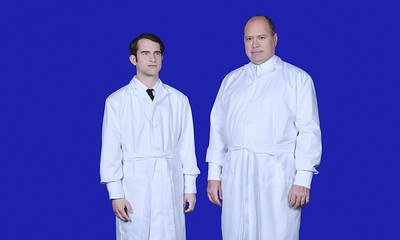This week, Sala Beckett premieres ‘L’altre’, a comedy written by Roc Esquius, our acting teacher. The text directed by Sergi Belbel offers a sincere portrait of the importance of other people in our lives and the transcendence of friendship. This Sala Beckett production is part of the Máquina Persona cycle, curated by Pau Alsina and Susanna Tesconi. It will be on show at the Sala Beckett until 5 June.
What did you want to talk about in ‘L’altre’?
Among other things, about friendship and our relationships with other people and, increasingly, with machines. Technology and Artificial Intelligence are advancing at such a frenetic pace that we don’t have time to consider the ethics of the products we are exposed to. L’altre poses a question: What would change if your best friend were a robot? And then, a tougher one: What does the company that programs this robot want? And while it poses these questions, it proposes a provocative game to the spectator: the six characters in the comedy are played by only two actors, so that each of them finds it increasingly difficult to find the other.
Before devoting yourself to the performing arts, you studied computer engineering. Did your career and professional experience in this field have been a reference to create ‘L’altre’?
Absolutely. My aim was to show a software development process to the public, in a fun and entertaining way (don’t be scared!). More and more, we relate to applications, programs and machines and it’s interesting to be able to see the genesis of a particular process. In my case, I worked for ten years in an artificial intelligence company and faced many ethical debates. It is beneficial to have minimal notions about what machines can do so that they move towards where we think they need to go.
What spaces do you think machines will occupy in the future of the performing arts?
It remains to be seen. Technology entered the theatre with the Greeks, with the famous Deus ex-machina, and at the end of the 19th century it revolutionised it with the advent of light and the growing complexity of electrical and mechanical elements. Now we have absolutely technological spheres (cinema cannot exist without them) that allow the performing arts to have any level of technology desired, from nothing to everything. However, there is still nothing comparable to feeling the emotion and energy of someone performing in the same space as the spectator. To the question of whether we would go to see perfect shows of robots performing… I don’t think so. At first yes, but eventually we would go back to flesh and blood. And skin. Because there is something that we are and that can’t be fabricated.
Loneliness is one of the great problems of our time. What solutions do AI offer?
For example, there are small robots designed to accompany elderly people who have no one to monitor them and alert medical services if they detect any anomaly. The other day I downloaded an app that allows you to talk to it and it is really disturbing when it makes you feel things. That’s why I find the debate so interesting, because we can create really useful apps, but we have to be aware of the repercussions. Today we have already tested the effects of social networks, but let’s take it a step further.
The ‘Máquina Persona’ cycle
‘L’altre’ is one of the three plays in the Máquina Persona cycle, curated by Pau Alsina and Susanna Tesconi and organized by the Sala Beckett and the Universitat Oberta de Catalunya (UOC).
The cycle focuses on the debate on the relationship between human beings and artificial intelligence in hybrid creation processes. In various shows, talks and activities, machines and people jointly explore the limits of creativity.

